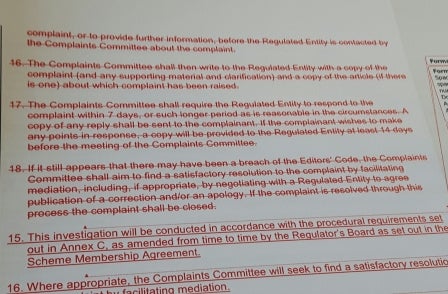
News publishers have been asked to agree changes to the system of press regulation which would stop them being able to “obfuscate and resist” standards investigations.
The revised rules for press regulator the Independent Press Standards Organisation have been published after a year of negotiations between the regulator’s board and publishers.
In January this year IPSO chairman Sir Alan Moses told the House of Lords that the existing IPSO rules were too complicated and weighed in favour of publishers.
He said: “We have gone to them with our proposals that require a large amount of red pencil putting through a large amount of these rules, getting rid – as we propose – of the eight or nine opportunities to obfuscate and resist the investigation.
"Many of the rules – this awful collection of rules and regulations – are opaque, sometimes self-contradictory, difficult to understand and sometimes difficult to find.
"One of our main tasks at the outset has been to identify those rules and regulations which we say need amending or cutting out in order to demonstrate an effective and robust simplicity and directness.
"I believe that that is the way we will demonstrate our independence. Only time will tell whether we can successfully persuade and convince others.”
Now the Regulatory Funding Company, the body which funds IPSO, has asked its member publishers to agree a new set of rules for the body. Most national and regional newspapers are members of IPSO as well as most major magazine publishers.
Some 66 per cent of regulated publishers must agree to the rules with more than 66 per cent agreeing in at least two out of three regulated sectors (national newspapers, regional newspapers and magazines).
The RFC board has already agreed to the changes as have the companies they represent: DMG Media, Northern and Shell, News UK, Telegraph Media Group, Newsquest, Johnston Press, Archant, DC Thomson and Conde Nast.
The proposed changes to IPSO rules:
-
Unlike the PCC, IPSO currently has no power to instigate inquiries in the absence of a complaint. The reformed regulations state that IPSO can now do so (within certain safeguards)
-
The new regulations strike out a number of ways in which a publisher can resist a standards investigation. They suggest taking away a publishers’ right to ask for a review when it is subject to a standards investigation and also take away a 14-day notice period before such an investigation where a publisher can make objections
-
At the end of an investigation, IPSO has the power to issue fines of up to £1m. Currently the Financial Sanction Guidance on such fines is issued by the publishers’ representatives on the Regulatory Funding Company. The new rules give the IPSO board power to issue this guidance, in consultation with the RFC
-
The new rules give IPSO the power to insist a publisher issues quarterly statements as a sanction for breach of the Editors’ Code
- The new rules suggest that publishers should have the right to request a review of a Complaints Committee decision (currently only complainants can do this)
- IPSO proposes that its appointments committee should decide on the pay of directors, rather than the Regulatory Funding Company.
Email pged@pressgazette.co.uk to point out mistakes, provide story tips or send in a letter for publication on our "Letters Page" blog
